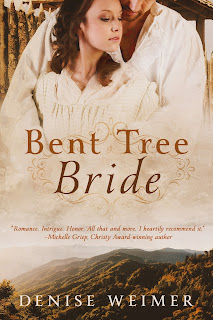by Denise Weimer
As the release date for my Eastern frontier historical romance, Bent Tree Bride, approaches, I’ve shared the history behind the Red Stick War (https://colonialquills.blogspot.com/2021/01/the-red-stick-war-whats-that.html) and the summer of 1813 battles at Burnt Corn Creek and Fort Mims (https://colonialquills.blogspot.com/search?q=burnt+corn+creek) to lay out events framing this little-known part of the War of 1812. We saw that a portion of the Creek Indians of modern-day Alabama, called Red Sticks, allied to the British in an attempt to keep their lands, while the Cherokees joined American forces under General Andrew Jackson with the same goal in mind. When the Red Stick Creeks began attacking their National Creek brethren, many National Creeks swarmed into Cherokee villages for refuge and called on the Cherokees for military defense. So did the Tennessee militia, later joined by Georgia and Mississippi militia.
On September 26, 1813, Cherokee Chief Charles Hicks, the real-life father of my fictional hero, Sam Hicks, relayed to the Cherokee Council the formal call to war by U.S. Indian Agent Colonel Return Jonathan Meigs, under Brigadier General James White of Knoxville. Cherokee Headman John Walker, whose son was married to the daughter of Meigs, replied that the Cherokees would supply five to seven hundred men.
By the way, the Walker-Meigs marriage of a Cherokee man to a white woman was very unique, and when my hero falls in love with his colonel’s daughter, he uses it to argue a precedent to his father in Bent Tree Bride. During the time, white men often took Cherokee wives, but the reverse was rare.
The volunteers were to serve a three-month stint in Colonel Gideon Morgan’s Cherokee Regiment of seven companies. Morgan had married a Cherokee woman and settled on their land, so he made a trusted leader. He serves as inspiration for Colonel Moore, my heroine’s father. Many of the Cherokee enlistees were past or present members of the Cherokee Lighthorse Brigade, a mounted patrol unit established by Cherokee Chief The Ridge in 1808. These veterans enlisted as men of rank or earned promotion.
Thirty-nine-year-old Cherokee Captain David McNair led a special spy or scout unit which my hero belongs to, made up of seventeen mounted volunteers from different companies. They were to wear white plumes or deer tails in their hair to identify themselves as American allies.
Many Tennessee militiamen mistrusted their Cherokee counterparts due to thefact that they’d been enemies as recently as the late-1700s. The militia made their way into Creek Territory, to the newly and roughly constructed, hundred-yard-square Fort Strother at the junction of the Coosa River and Canoe Creek. Across the shoals of the river was a small, friendly Creek village known as Oti Palin, Ten Islands. The fort included an eight-hut hospital complex, twenty-five tents for soldiers, and space for a hundred hogs. At Fort Strother and Turkey Town, much of the action of Bent Tree Bride takes place.
On October 29, 1813, a large group of Cherokees mustered into service at the Cherokee Agency, where Meigs addressed them, saying, “We are a band of brothers in this war acting in a common cause.” He cautioned them against “acts of barbarity” and promised that honor would come to those who served if they rejected traditional values that stressed individual action for status.
From the fort at Hiwassee, they navigated the mountains of Northern Alabama by way of the Cherokee village of Turkey Town. There they learned the Red Sticks had gathered in a nearby village. The Cherokees set out on their own to confront them, finding the victims of General Coffee’s Tennessee militia at Tallushatchee … where my conflicted Cherokee lieutenant first tests himself in action.
My May post will relate what actually happened at Tallushatchee and Talladega.
Represented by Hartline Literary Agency, Denise Weimer holds a journalism degree with a minor in history from Asbury University. She’s a managing editor for the historical imprints of Lighthouse Publishing of the Carolinas and the author of a dozen published novels and a number of novellas. A wife and mother of two daughters, she always pauses for coffee, chocolate, and old houses!
Connect with Denise here:
Monthly Newsletter Sign-up
Website
BookBub




No comments:
Post a Comment
Thanks for commenting, please check back for our replies!